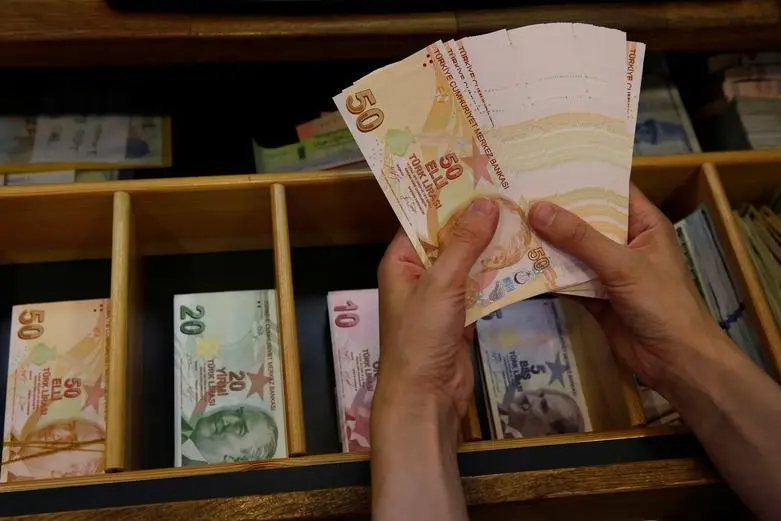PHOTO
ISTANBUL- The Turkish lira fluctuated sharply near a new record low on Wednesday as the central bank said it had intervened due to "unhealthy" market prices, while President Tayyip Erdogan again doubled down on his pre-election strategy of sharp rate cuts.
The volatile trade in low liquidity came after the emerging market currency logged its second-worst month ever in November, hammered by Erdogan's endorsement of sharp monetary easing despite soaring inflation and widespread criticism.
The central bank - which Erdogan has overhauled and pressured this year - said in a statement it "directly" intervened in the market "via selling transactions due to unhealthy price formations in exchange rates".
The lira, which had earlier weakened as far as 13.87 to the U.S. currency, rebounded as far as 12.42 - a rally of more than 8% on the day. However, by 1108 GMT, it was just 1.2% firmer at 13.25.
The lira slumped to an all-time low 14.0 on Tuesday after Erdogan defended the economic policy and as the dollar benefited from hawkish U.S. Federal Reserve comments.
Then, for the sixth time in two weeks, Erdogan affirmed his commitment to low interest rates on Wednesday, telling Turks to act with reason and avoid panic and vowing to fix inflation rapidly.
"Turkey has now abandoned the monetary policy based on high interest rates that caused several developing countries to remain stagnant," he told lawmakers from his ruling AK Party in parliament.
"Instead, we have transitioned to a growth strategy aiming for investment, employment, production and exports," he said. "Interest rates are an evil that make the rich richer and the poor poorer."
The currency has lost as much as 47% of its value this year, sinking some 30% in November alone, rapidly eroding Turks' earnings and savings, upending household budgets and even leaving them scrambling to find some imported medicines.
'NO TURNING BACK'
In an interview with state broadcaster TRT on Tuesday evening, Erdogan said there was "no turning back" from the new policy, defending an easing policy which most economists have called reckless.
"We will see that the interest rates will fall markedly and hence there will be an improvement in exchange rates before the elections," he said.
Polls are set for no later than mid-2023.
"It's a dangerous experiment Erdogan is trying to run and the market is trying to warn him about the consequences," said Wisconsin-based Brian Jacobsen, senior investment strategist in multi-asset solutions at Allspring Global Investments.
"Imports are likely to rise in price as the lira falls, making inflation worse. Foreign investment could be scared away, making it harder to finance growth. Credit default swaps are pricing in a higher risk of default," he added.
"Investors are getting more and more nervous. ... It's a toxic brew."
Last month's sell-off was among the largest suffered by the lira, comparable with crises which the major emerging market economy faced in 2018, 2001 and 1994.
Erdogan's AK Party, which came to power in the wake of the 2001 crisis, is seeing its support tumble in opinion polls, which show Erdogan would lose head-to-head with the most likely presidential opponents.
Since September, the central bank has cut its policy rate by 400 basis points to 15% under pressure from Erdogan, leaving real rates deeply negative, with inflation near 20%. It is widely expected to lower it again in December.
The opposition has called for an immediate policy reversal and snap elections.
Economists say the depreciation and accelerated inflation - which is seen reaching 30% next year due in large part to the currency devaluation - will derail Erdogan's plan. Virtually all other central banks are raising rates or preparing to do so.
November inflation data will be released on Friday and a Reuters poll forecast that it will rise to an annual 20.7%, the highest level in three years.
The growing price pressures were illustrated by figures on Wednesday showing retail prices in Turkey's largest city Istanbul jumped 4.71% month-on-month in November for an annual increase of 24.05%.
(Additional reporting by Ece Toksabay and Rodrigo Campos in New York; Writing by Daren Butler; Editing by Jonathan Spicer, Edmund Blair and Bernadette Baum) ((daren.butler@tr.com; +90-212-350 7053; Reuters Messaging: daren.butler.thomsonreuters.com@reuters.net))





















